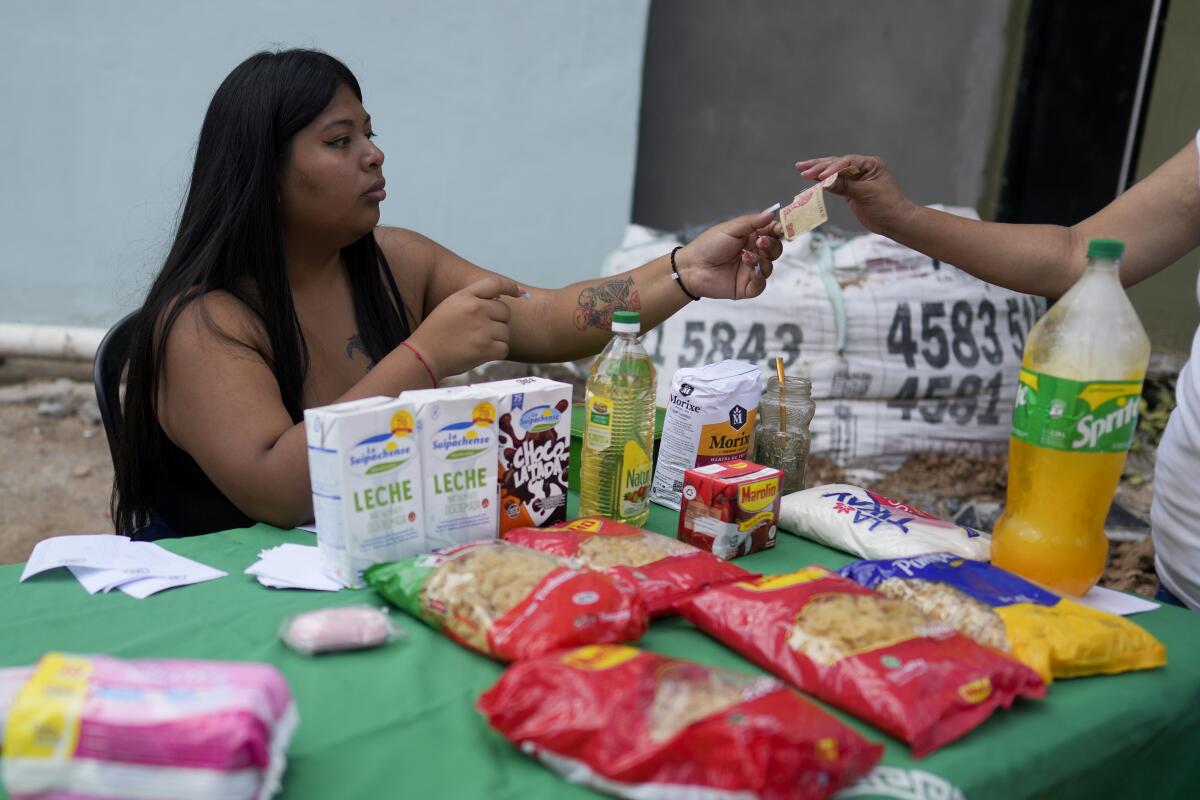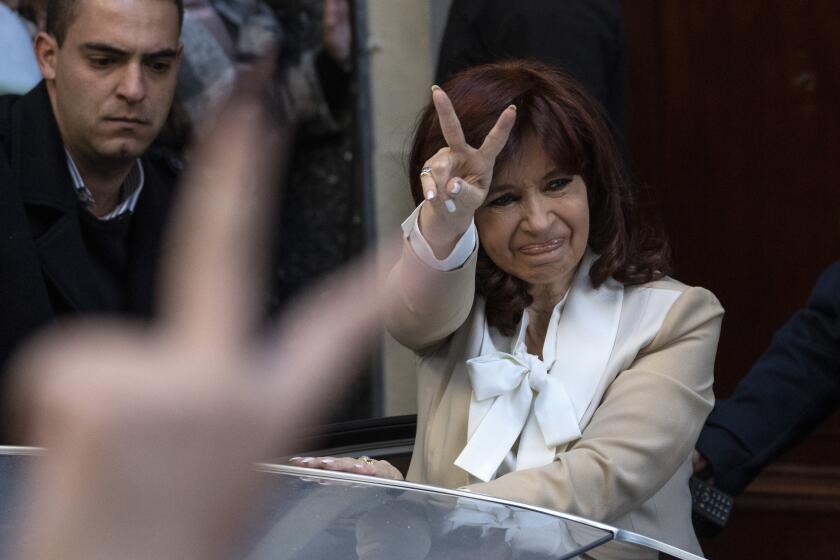Inflation over 100%? It’s the reality in Argentina, where daily life is a struggle

- Share via
BUENOS AIRES — Jesica Fernández used to join seven family members every weekend for a large beef barbecue. But the meat is no longer on the menu, and now she and her family are more likely to eat spaghetti or chicken wings.
In beef-loving Argentina, barbecues happen only on birthdays or special occasions nowadays, Fernández said.
Fernández, 31, is among millions of Argentines struggling to make ends meet as the country’s annual inflation rate clocked in at 102.5% in February, the first time it has reached triple digits since 1991.
Fernández was shopping recently at a market sponsored by the Lomas de Zamora municipality, about 15 miles from Buenos Aires, where businesses offer basic goods at lower prices in exchange for free retail space.
“We buy less beef and we buy fewer things. In reality, you can’t give yourself the luxuries that you could before,” Fernández said,
Argentina’s Indec statistics agency said this week that consumer prices increased 6.6% in February from the previous month, a higher number than expected, on top of years of double-digit annual inflation over the last decade. Food prices were among those that increased the most in February, rising 9.8% from January, in part because of a punishing drought that has pushed prices of meat and other goods higher.
Market analysts are reacting with deep skepticism to a proposal floated by the leaders of Brazil and Argentina to launch a common currency.
“The situation is very difficult, and every day it gets worse,” said Daisy Choque Guevara, 42.
Mabel Espinosa, 37, was walking around the market with her 10-day-old baby, Gael, hoping to find deals to buy enough food for herself, her husband and six children.
“The money isn’t enough for anything,” Espinosa said. “Barbecues? Forget about it.”
President Alberto Fernández has been struggling to put the brakes on the country’s soaring inflation rate, which will undoubtedly be a key issue in the presidential election set for October.
Though the Oscar-nominated film is a feature, ‘the testimonies and the closing arguments are exactly what happened in court, word for word,’ says Luis Moreno Ocampo, who served as deputy prosecutor at the trial.
Argentines have long suffered major bouts of inflation worse than in other countries because of the government’s penchant for printing money to finance spending. That trend accelerated during the COVID-19 pandemic, while a sharp depreciation of the local currency also pushed prices higher.
Fernández’s center-left administration has tried to rein in the spiraling costs through price controls that have largely failed. Much of the opposition says Argentina needs a broader stabilization plan that includes a sharp decrease in government spending.
“We obviously think the inflation data is bad, very bad. Plus, it was unexpected,” presidential spokeswoman Gabriela Cerruti said Thursday.
“The government remains firmly committed to controlling prices, controlling inflation, reducing inflation.”
Espinosa, however, is not convinced that things will improve, at least in the short term.
Thousands of fans lined up in the wee hours to try to get a glimpse of Argentina’s victorious World Cup soccer team on its return from Qatar.
“I call it resignation — nothing will change. … Why get angry?” she said. “Today you get something at one price, and tomorrow it will be another price. But it doesn’t matter: You have to pay for it because you need it.”
People have had to make cuts where they can.
“For example, if I could buy two yogurts before, now I can only buy one,” said Roxana Cabrera, 38. “It’s very difficult to buy now. You have to search for [lower] prices.”
Anything that isn’t absolutely essential is left for a later date.
Start your day right
Sign up for Essential California for the L.A. Times biggest news, features and recommendations in your inbox six days a week.
You may occasionally receive promotional content from the Los Angeles Times.
“I was able to buy clothes before, for example, but not anymore,” Cabrera said. “Now I can only buy food.”
For some, the choices are even more drastic.
“We don’t eat dinner,” said Yanet Nazario, who lives with three of her children and seven grandchildren in an impoverished neighborhood in Buenos Aires. She was buying flour and soap from an improvised stand set up by a cooperative in her neighborhood that sells a few basic goods at lower prices than in the stores.
“There’s a lot of sacrifice now because the money you make isn’t enough. You have to work a lot more. We have to go to soup kitchens,” Nazario said.
Argentina’s Vice President Cristina Fernández has been found guilty of committing a $1-billion fraud involving public works contracts during her presidency.
The children in her household get dinner from soup kitchens that now limit their food to only young people because overall demand has become so high.
“We adults only drink a cup of tea” for dinner, Nazario said. “The next day we’ll skip breakfast, and have lunch.”
More to Read
Sign up for Essential California
The most important California stories and recommendations in your inbox every morning.
You may occasionally receive promotional content from the Los Angeles Times.















